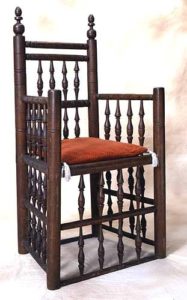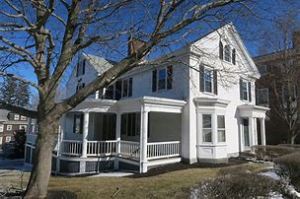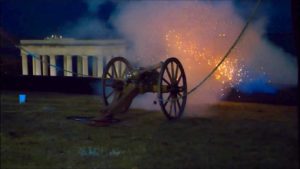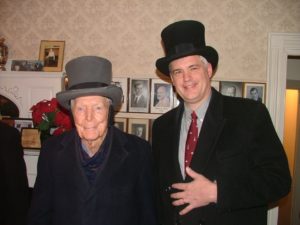The Old Colony Club is reported to be the oldest men’s club in the western hemisphere! Formed in January of 1769 by seven Plymouth men, this is its 250th year! On December 22 of that first year they first commemorated the landing of the Pilgrims on Plymouth Rock. Known as “Old Colony Day” and later as “Forefathers Day,” the December 22nd date was chosen to adjust to the New Style or Gregorian calendar implemented in 1752. But only ten days were needed, so they were one day off! But that has not bothered members of the Club for 250 years!
 The account of the first commemoration is as follows: “On the morning of the said day (Dec. 22, 1769), after discharging a cannon, was hoisted upon the hall [Old Colony Hall of which there are no pictures] an elegant silk flag, with the following inscription, ‘OLD COLONY, 1620’. At eleven o’clock, A.M. the members of the club appeared at the hall, and from thence proceeded to the house of Mr. Howland, inn-holder, which is erected on the spot where the first licensed house in the Old Colony formerly stood [now the site of the former Santander Bank on North Street], at half after two a decent repast was served, which consisted of the following dishes, viz. 1, a large baked Indian whortleberry pudding; 2, a dish of succotash; 3, a dish of clams; 4, a dish of oysters and a dish of codfish; 5, a haunch of venison, roasted by the first Jack brought to the colony; 6, a dish of seafowl; 7, a dish of frost fish and eels; 8, an apple pie; 9, a course of cranberry tarts, and cheese made in the Old Colony.”
The account of the first commemoration is as follows: “On the morning of the said day (Dec. 22, 1769), after discharging a cannon, was hoisted upon the hall [Old Colony Hall of which there are no pictures] an elegant silk flag, with the following inscription, ‘OLD COLONY, 1620’. At eleven o’clock, A.M. the members of the club appeared at the hall, and from thence proceeded to the house of Mr. Howland, inn-holder, which is erected on the spot where the first licensed house in the Old Colony formerly stood [now the site of the former Santander Bank on North Street], at half after two a decent repast was served, which consisted of the following dishes, viz. 1, a large baked Indian whortleberry pudding; 2, a dish of succotash; 3, a dish of clams; 4, a dish of oysters and a dish of codfish; 5, a haunch of venison, roasted by the first Jack brought to the colony; 6, a dish of seafowl; 7, a dish of frost fish and eels; 8, an apple pie; 9, a course of cranberry tarts, and cheese made in the Old Colony.”
 Though this was not the first commemoration held in Plymouth of the landing of the Pilgrims (that was done in 1720); this was the original Pilgrim holiday, soon known as Forefathers Day, remembering the day 18 men in the Shallop landed on Plymouth Rock. Baker’s notes continue “The dinner itself incorporated a number of emblematic elements to emphasize the importance of the event. The food selected was intrinsically native and ‘…dressed in the plainest manner (all appearance of luxury and extravagance being avoided, in imitation of our ancestors, whose memory we shall ever respect.)’
Though this was not the first commemoration held in Plymouth of the landing of the Pilgrims (that was done in 1720); this was the original Pilgrim holiday, soon known as Forefathers Day, remembering the day 18 men in the Shallop landed on Plymouth Rock. Baker’s notes continue “The dinner itself incorporated a number of emblematic elements to emphasize the importance of the event. The food selected was intrinsically native and ‘…dressed in the plainest manner (all appearance of luxury and extravagance being avoided, in imitation of our ancestors, whose memory we shall ever respect.)’
 The president sat in a chair that had belonged to Governor William Bradford, and called for a dozen toasts to honor the memory of their ancestors, and to give assent to the need for liberty and prosperity. Among these were toasts to John Carver and the other governors… to Myles Standish; Massasoit; Deacon Robert Cushman; the union of the Old Colony and Massachusetts; the sentiments against arbitrary power; the downfall of those opposing civil and religious liberty; the deliverance of the colonies from oppression; a lasting union with Britain and prosperity to all the colonies. After the toasts, the evening was spent “recapitulating and conversing upon the many and various advantages of our forefathers in the first settlement of this country, and the growth and increase of the same, — at eleven o’clock in the evening a cannon was again fired… (and) three cheers given.”
The president sat in a chair that had belonged to Governor William Bradford, and called for a dozen toasts to honor the memory of their ancestors, and to give assent to the need for liberty and prosperity. Among these were toasts to John Carver and the other governors… to Myles Standish; Massasoit; Deacon Robert Cushman; the union of the Old Colony and Massachusetts; the sentiments against arbitrary power; the downfall of those opposing civil and religious liberty; the deliverance of the colonies from oppression; a lasting union with Britain and prosperity to all the colonies. After the toasts, the evening was spent “recapitulating and conversing upon the many and various advantages of our forefathers in the first settlement of this country, and the growth and increase of the same, — at eleven o’clock in the evening a cannon was again fired… (and) three cheers given.”
In 1770 a small parade was added as well as an oration given by Edward Winslow, Jr. who closed with these words: “…if we, their sons, act from the same principles, and conduct with the same noble firmness and resolution, when our holy religion or our civil liberties are invaded, we may expect a reward proportionate…” In 1772, Samuel Adams took note of the celebration since Plymouth was the first town to respond to his Committees of Correspondence, saying “on the return of that great Anniversary, the landing of the first Settlers at Plymouth.”
 Though the American Revolution divided members between Loyalist and Patriot, the OCC ceased to exist by 1774, so in 1820 its successor, the Pilgrim Society, was born. The first Forefathers Day celebration was on December 22nd in 1819, with the only surviving member from the original Old Colony Club being John Watson. By 1875 the commemoration was conducted in Pilgrim Hall. In 1883 the Club was incorporated as a “legal restoration of the original 1769 organization” and in 1893 the Club bought the property on the corner of Court and Brewster streets where it continues to meet today.
Though the American Revolution divided members between Loyalist and Patriot, the OCC ceased to exist by 1774, so in 1820 its successor, the Pilgrim Society, was born. The first Forefathers Day celebration was on December 22nd in 1819, with the only surviving member from the original Old Colony Club being John Watson. By 1875 the commemoration was conducted in Pilgrim Hall. In 1883 the Club was incorporated as a “legal restoration of the original 1769 organization” and in 1893 the Club bought the property on the corner of Court and Brewster streets where it continues to meet today.
 The modern tradition of a parade at 6 AM wearing Victorian top-hats; marching to Cole’s Hill and hearing recitations honoring the Pilgrims’ faith, courage and fortitude, was restored in 1956 and continues to this day. The firing of a cannon three times over Plymouth Rock to the “hip, hip hurrah” of raised hats is something I always look forward to each year. After all, where can you do this but in Plymouth where we wake up the town on December 22nd three days before Christmas by firing a cannon at such a venerable spot?
The modern tradition of a parade at 6 AM wearing Victorian top-hats; marching to Cole’s Hill and hearing recitations honoring the Pilgrims’ faith, courage and fortitude, was restored in 1956 and continues to this day. The firing of a cannon three times over Plymouth Rock to the “hip, hip hurrah” of raised hats is something I always look forward to each year. After all, where can you do this but in Plymouth where we wake up the town on December 22nd three days before Christmas by firing a cannon at such a venerable spot?
As a member of the Old Colony Club I have enjoyed the comradery of others who have an interest in the history of Plymouth and the values of the Pilgrims. From the historic photos of Plymouth on the walls to those of past Presidents of the Club, history abounds in this historic building. With a painting of George Washington hanging on the wall; no wonder many are patriotic, love their nation and are a bit put off by modern revisionism and political correctness. In Clubs such as this one, individuals have much more freedom to discuss differences and express personal opinions without being marginalized or ostracized. It is refreshing to have such a place in our present culture. The history of the Old Colony Club parallels that unique band of Separatists called Pilgrims who gathered together in covenant, desiring to discuss their faith freely within a cultural climate of intense tension.
 It was John G. Talcott, Jr. who inspired me to join the Old Colony Club in 1992. He had invited the Club to lead the festivities in 1970 at the 350th anniversary of the founding of Plymouth. In 2020, I intend to include the Old Colony Club as we re-enact the landing in the more favorable climate of late June! Scripture tells us to “hold the traditions which you have been taught” (2nd Thessalonians 2:15) and “remove not the ancient landmark.” (Proverbs 22:28) Certainly the Pilgrims held to the kind of holy ideas referred to in these passages and thus maintaining traditions like honoring the day on which they landed on Plymouth Rock are good for they point back to the values, drawn from the Bible, that became “stepping stones unto others.” Though not all may revere the same values in the same way, we must do our part to preserve the atmosphere where valuable ideas are respected and discussed freely. Let us hold fast to such traditions and the freedoms we cherish, passing this on to the next generation!
It was John G. Talcott, Jr. who inspired me to join the Old Colony Club in 1992. He had invited the Club to lead the festivities in 1970 at the 350th anniversary of the founding of Plymouth. In 2020, I intend to include the Old Colony Club as we re-enact the landing in the more favorable climate of late June! Scripture tells us to “hold the traditions which you have been taught” (2nd Thessalonians 2:15) and “remove not the ancient landmark.” (Proverbs 22:28) Certainly the Pilgrims held to the kind of holy ideas referred to in these passages and thus maintaining traditions like honoring the day on which they landed on Plymouth Rock are good for they point back to the values, drawn from the Bible, that became “stepping stones unto others.” Though not all may revere the same values in the same way, we must do our part to preserve the atmosphere where valuable ideas are respected and discussed freely. Let us hold fast to such traditions and the freedoms we cherish, passing this on to the next generation!







